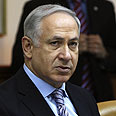

Netanyahu gives Clinton written commitment
After 40-minute phone conversation with prime minister, US secretary of state says pressure on Israel paid off. Response remains confidential, but American media report Netanyahu sent concluding document with Israeli reply to demands. White House: Obama-Netanyahu meeting yet to be scheduled
WASHINGTON – Prime Minister Benjamin Netanyahu has sent a written document to US Secretary of State Hillary Clinton during her visit to Moscow, reflecting the Israeli agreement to the Obama administration's demands, American media reported Saturday. The document was sent following a 40-minute phone conversation between the two officials.
The Politico website quoted diplomatic sources as saying that Netanyahu's document reflects the things he has agreed to do in response to Clinton's demands. The same demands were made in the previous phone conversation between the two eight days ago, which was particularly difficult and lasted even more than 40 minutes.
The sources refused to elaborate on the details of the prime minister's document. Clinton failed to refer to Netanyahu's response in details as well during a meeting of the International Quartet on the Middle East in Russia, but agreed to say that he has given her useful and beneficial answers.
A senior official at the Prime Minister's Office said Friday evening that Netanyahu had agreed to take trust-building measures and make gestures to the Palestinians, although not in Jerusalem. "His policy says yes to flexibility, but not in Jerusalem," the source said.
US media reported Thursday that the two countries have reached an agreement of "don't ask, I won't tell" in terms of the construction in Jerusalem – a state of vagueness which will allow Netanyahu to hold onto his right-wing coalition.
Healthcare reform most important
Clinton told the BBC on Friday, "I think we're going to see the resumption of the negotiation track and that means that it is paying off because that's our goal. Let's get the parties into a discussion, let's (get) the principle issues on the table and let's begin to explore ways that we can resolve the differences."
In these remarks, the US secretary confirmed that the prime minister has agreed to the American demand to discuss the core issues, and not just the formalities of the negotiations.
The next step in the process will be US special envoy George Mitchell's arrival in Israel on Sunday in order to prepare the ground for Netanyahu's meetings in Washington on Monday and Tuesday.
The American administration has confirmed that the prime minister would meet with the secretary of state in Washington, but despite a FOX News report that he would also meet with President Barack Obama, the White House press secretary said Friday evening that such meeting was not on the agenda at the moment.
President Obama will be busy this morning with the most important political move in his presidency – an attempt to pass his healthcare reform program at the House of Representatives on Sunday. White House officials are making many efforts this weekend to persuade House representatives to support the reform.
According to estimates, a decision on a possible Obama-Netanyahu meeting will be made only after things become clear in Washington and Jerusalem, following Mitchell's meeting with Netanyahu.
Molcho and Ross work together
The Washington Post quoted diplomats as saying that in spite of Clinton's optimism, the White House was still lacking a discrete channel which would allow Obama and Netanyahu to handle sensitive issues together.
The newspaper mentions the activity of Attorney Yitzhak Molcho's, Netanyahu's close associate, as a positive step in that direction. According to the Washington Post, Molcho worked closely behind the scenes on the Israeli response with senior National Security Council official Dennis Ross.
Elliott Abrams, who served as deputy national security advisor under President George W. Bush, told the newspaper that after meeting with Clinton on Friday, the Quartet echoed the administration's use of the word "condemn" when it referenced the housing project in east Jerusalem.
Before the Obama administration, the Quartet had never made a reference to east Jerusalem housing disputes and Friday's statement made it a central dispute which will only complicate future negotiations, Abrams said.
Former US Ambassador to Israel Martin Indyk, on the other hand, said the administration in the past 10 days has made the Israeli government "supersensitive" to the issue of Jerusalem. Indyk, vice president for foreign studies at the Brookings Institution and an advisor to Mitchell, praised the administration for not revealing its demands and said American officials adroitly turned down the heat as quickly as they turned it up.















